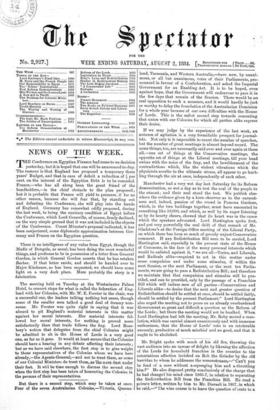Manchester had a very wet day last Saturday for its
Reform demonstration, so wet a day as to test the zeal of the people to the utmost; and their zeal stood the test. We publish else- where the evidence given by a keen observer as to the earnest- ness and, indeed, passion of the crowd in Pomona Gardens, which, in the two buildings together, must have amounted to something like 50,000, and which, as well by its eager listening as by its hearty cheers, showed that its heart was in the cause which the speakers advocated. Lord Harlington spoke first, and put very powerfully the real drift of that remark of Mr. Gladstone's at the Foreign-Office meeting of the Liberal Party, on which there has been so much of grossly unjust Conservative comment. If any Redistribution Bill were to be carried, Lord Harlington said, especially in the present state of the House of Commons, in the face of the many personal interests which would be enlisted against it, "we are all—Tories, and Liberals, and Radicals alike—required to act in this matter under some compulsion and under some stimulus, if within the next Session, or the next Parliament, or the next ten Parlia- ments, we are going to pass a Redistribution Bill ; and therefore we maintain that that compulsion and stimulus will be pro- vided, and can be provided, only by the passage of a Franchise Bill which will induce men of all parties—Conservatives and Liberals alike—to desire that the next and greater question of Redistribution should be settled at once, should be settled fairly, should be settled by the present Parliament." Lord Harlington also urged the meeting not to press on an already overburdened Government so great and difficult a question as the Reform of the Lords ; but there the meeting would not be baulked. When Lord Harlington had left the meeting, Mr. Roby moved a reso- lution, which was carried almost unanimously and with immense enthusiasm, that the House of Lords' veto is an intolerable anomaly, productive of much mischief and no good, and that it ought to be abolished.


































